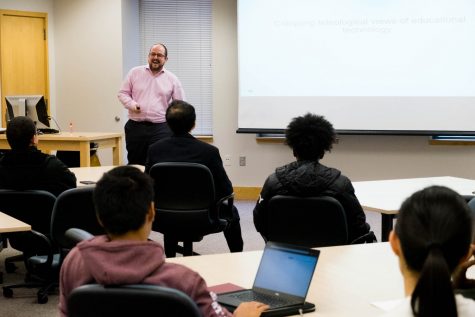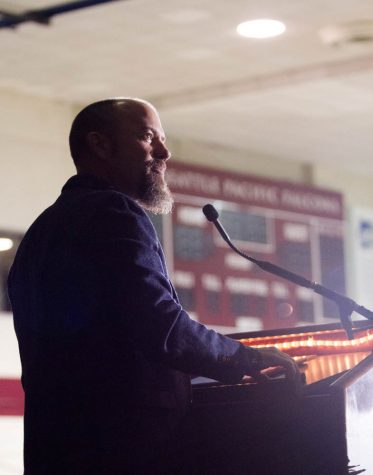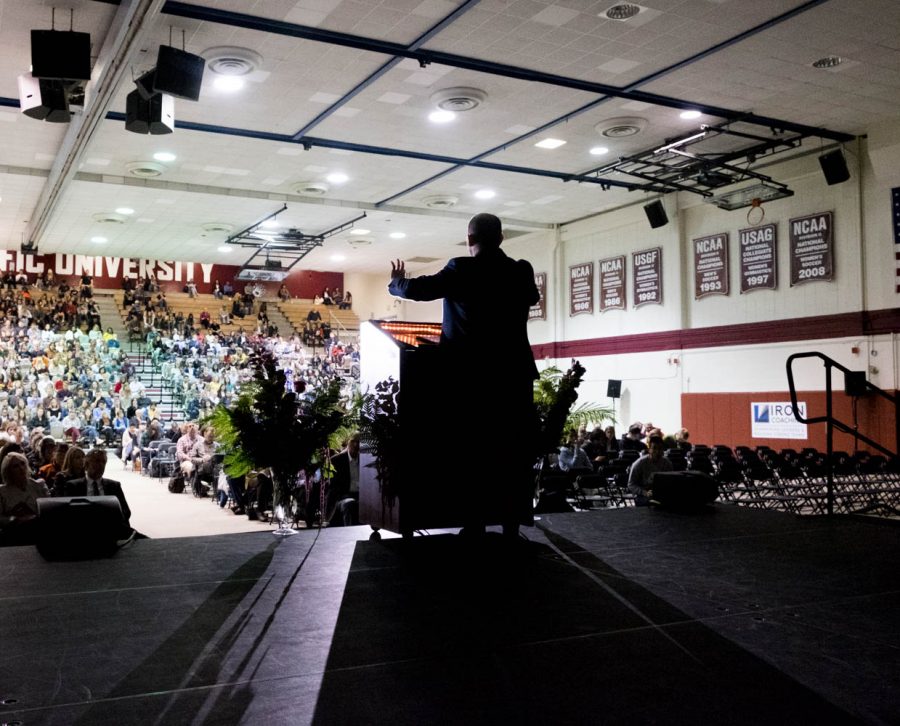Love and discernment
Day of Common Learning keynote speaker, James K. A. Smith, discusses how Christianity influences society.
October 23, 2019
What would the world look like if people lived in service of one another — if love was dominant? This was the main focus of James K. A. Smith’s keynote address, “Practicing the Prophetic: Liturgy, Formation, and Discernment for Public Life,” at the Seattle Pacific University Day of Common Learning 2019.
Smith’s speech challenged SPU students and faculty alike to consider the ways that society affects their priorities as Christians, and whether working towards love and reconciliation should instead be their focus.
“I think it’s a way to, sort of, understand how we can make a difference in the world,” said communications professor Bill Purcell. “I like this idea of not being caught up in Christianity, and how our practice can make a difference in the world.”
Smith’s speech addressed the ways that Christian practices are moving away from those goals, and the priorities he recommends Christians adopt instead.
Welcomed by President Daniel Martin and Interim Provost Bruce Congdon, Smith complemented the Day of Common Learning: “It’s a fantastic opportunity for a university to gather around ideas at the intersection of faith and society.”
The breakout sessions following the keynote address centered around community, art, technology, and culture. For example, some of the sessions featured discussions of “Technology and Hope” and “Homeless and Human.”

John Robertson of SPU speaks during the Technology and Hope lecture as a part of the 18th Annual Day of common Learning programming.
Opening his address, Smith said that Christian practices have been assimilating into “the defaults of the majority culture.” The public is not just something people engage with, but something that has a profound effect on people, he said.
“The Christian liberal arts project of an institution like Seattle Pacific is really a fulcrum for cultivating a prophetic witness in our cultural moment,” he said, but continued that Christian communities have a long way to go.
He believes that Christian communities need to find a better balance between the church and other institutions. SPU being an example of this balance, he said, being both Bible centered and academically rigorous. As a result, Smith’s hope is that Christians can better love our neighbors and bring back a public life centered around love.
Smith suggests that Christians would do well to learn from Saint Augustine, a third century Christian theologian, to refocus themselves on what he believes God calls them to. Augustine said that, although we are not on the earthly plane for long, we still play a role in the coming of heaven — but we also can’t make it come prematurely.
“We ought not want to live ahead of time,” Smith said, quoting Augustine.
Smith emphasized “discernment,” which has two sides. The first, he said, is to take a personal inventory of our liturgies and institutions. This involves taking stock of one’s daily routines and rituals, assessing not just what they do for that person, but what it can do for others — how does it shape your love?
In turn, the second step is to think about how this strategy can change someone’s life and the lives of those around them — he challenged the audience to think about how they can be better neighbors and love more openly.
Smith believes that a university is the perfect place for this sort of personal and cultural reflection, and to discover areas and opportunities for collaboration.
Smith then moved into the discussion of the relationship between politics and Christianity, and how it may affect the Christian focus on love.
“It’s precisely because we are called to love our neighbors that this translates into a Christian obligation to invest in political institutions,” he said.

Dr. James K.A. Smith turns towards the screens while delivering the keynote address of the 18th annual Day of Common Learning.
Smith acknowledged that, given the political climate, it may be easy to “withdraw from institutions” — but this, he argued, would “be abandoning our neighbors.” He said Christians must achieve personhood and balance so they can build institutions that will shield and protect vulnerable “neighbors”.
Smith’s speech then moved into the idea of the “art of prophetic hope.”
“[It] requires the renewal of Christian imagination and an outward offering of Christian imagination for the sake of the world,” Smith said.
“Christians are not optimists,” Smith said.
Christians have an innate gift for naming evil, for noticing when things are not what they should be, and therefore can be the only ones with the ability to imagine a world without evil, one centered in love.
Smith displayed various works of art throughout the talk, one being “The Tomb of Madame Langhans” created in 1751 by Johann August Nahl. Another was “Sugar and Spice,” by Letitia Huckaby. He says that both invoke feelings of urgency, a sense that we are close to a more loving world, but we are not quite there yet.
“We may be the generation that learns such choreography. Learning, paradoxically perhaps, to dance our laments as a testament to hope,” Smith said.


























































































